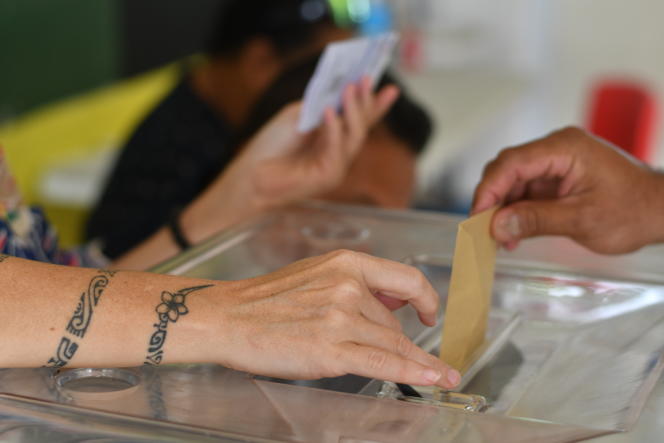The party of Polynesian President Edouard Fritch, supported by the Alliance Ensemble! of the President of the Republic, dominated, Saturday, June 4, the first round of the ballot, marked by a very high abstention, which reached scores of 50% to more than 60% depending on the constituencies. Its three candidates will be opposed to a separatist in the second round, themselves close to the New Popular Ecological and Social Union (Nupes, left-wing coalition led by La France insoumise).
Like the French abroad, the Polynesians voted a week in advance of France and the other overseas territories, to allow the delivery of electoral material to the isolated islands between the two towers. The second will take place on June 18, in this overseas community of the Antipodes which has a twelve-hour time difference with Paris.
The left-right cleavage and the French parties have a relative existence in Polynesian political life: for four decades, it has focused on the opposition between autonomy (competences shared between the French state and local government) and independence. … Even when twenty-seven candidates stand for election, as in this first round.
A figure of local autonomy, several times Minister of Tourism and Labour, Nicole Bouteau is the favorite in the 1st constituency after her large victory (42.17%) against the youngest of the candidates, Tematai Legayic (19.61%), a 21-year-old independentist.
The outcome is more uncertain in the 2nd constituency: another separatist, Steve Chailloux (28.78%), has shaken up the hegemony of the Tapura huiraatira, the party of Edouard Fritch. The latter’s candidate, Tepuaraurii Teriitahi, won the first round (33.21%), but may fear an alliance of oppositions.
In the 3rd constituency, it is the outgoing independence MP, Moetai Brotherson (34.26%), who wins by a few hundred votes over the majority candidate, Tuterai Tumahai (32.04%), a newcomer in Politics.
No triangular
Neither the emerging parties nor the former president of Polynesia, Gaston Flosse, ineligible but still party leader, therefore managed to qualify a candidate for the second round. At 90, Mr. Flosse remains combative against his ex-son-in-law and former vice-president, Mr. Fritch, who has become his best enemy, but the defeats follow one another.
The low participation did not allow any triangular, which would have favored the majority. The separatists can hope for at least one seat by uniting the opposition to Mr. Fritch’s government. His handling of the Covid-19 crisis has been widely criticized. He was even condemned, the day before the election, for having provided musical entertainment for the wedding of one of his ministers in front of several hundred guests, ten months earlier, in the midst of an epidemic, a few days after announcing measures prohibiting this type of festivities. This minister, also sentenced, is still in government.
Mr. Fritch retains a majority in the Assembly of French Polynesia, however, and won the first round by a large margin in terms of votes. He therefore leaves with an advantage for the most important elections in the community: the territorial ones of 2023.

















